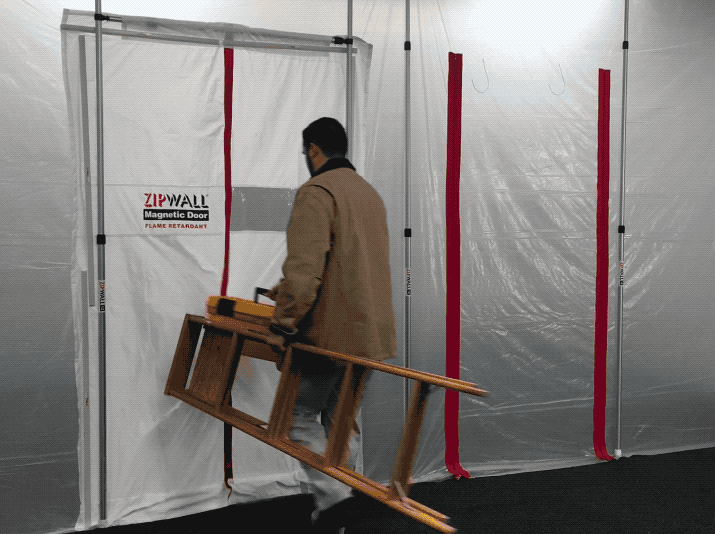
Commercial Construction & Renovation – ZipWall® Dust Barrier Keeps Retail Doors Open Aug 2018
Working on any commercial renovation or remodeling project can be challenging, and working in retail settings that must remain open and accessible to the public can be especially tricky. Most retail businesses do not have the luxury of closing down for a project, even when there is dust involved. The merchandise has to stay dust-free, and customers should be inconvenienced as little as possible. Without a professional dust barrier system – like the ZipWall® Dust Barrier System – the amount of time it takes for a contractor to install and take down makeshift barriers with tape and plastic can sometimes mean the difference between a profit and loss on the project.
Aaron Claypool is superintendent for Pacific National Construction, a large commercial construction and renovation contractor in Southern California with about 300 employees. Pacific National clients include major retailers, theme parks, hospitals and airports – businesses that don’t have the option of shutting down for a renovation or remodeling project.
Claypool says he confronts the same challenge on nearly every job: keeping the doors open for business and keeping his clients and their customers happy during renovation. To help meet those challenges, Pacific National relies on the ZipWall Dust Barrier System to control dust on the jobsite.
“Ready or not, foot traffic comes through the door at store opening,” says Claypool. “No matter how big or involved our projects are from evening until the morning, customers walk in at 10 o’clock whether we are ready or not, and not being ready is not an option.”
Tile Removal at Night through a Retailer’s Cosmetics and Women’s Shoes Departments
For a recent project at a high-end national department store in Las Vegas, Pacific National has been removing tile from floors in two of the retailer’s key departments: cosmetics and women’s shoes, “their bread and butter,” says Claypool. Interfering with business in any way was not an option.
Claypool knows the disadvantages of homemade tape and plastic dust barriers. “That’s why I advised the contractor working on the retail store project to use the ZipWall Dust Barrier System.”
“For this project, we had to demo all of the existing floor tile at night without disrupting the departments,” Claypool says. “We used the ZipWall Dust Barrier System with its 12 foot spring-loaded poles to go right down the middle of both departments and install the plastic dust barriers on each side of the aisles with no ladders or tape. We chipped tile all night, did our floor grinding, removed the ZipWall barriers in the morning, and the merchandise around us was clean and still in its place – it’s as if the tiles disappeared overnight,” says Claypool.
“The store managers had no idea how much had gone into the project before they arrived in the morning. We mowed right through the middle of the merchandise without affecting products that are sensitive to dust.”
The ZipWall Dust Barrier System Advantage
The key advantage of the ZipWall Dust Barrier System, according to Claypool, is that it saves time – lots of time.
“And time is money,” he adds. “I used to waste a lot of time building makeshift dust barriers using ladders and tape. It’d take me three hours to build the barrier, then I’d demo a large area for four or five hours and still need an additional two hours to pull everything down and clean the area to make it seem like we weren’t there. By using the ZipWall system, we spend more time doing the actual work, as opposed to preparing the site and cleaning up afterwards.”
The ZipWall Dust Barrier System is a comprehensive dust protection solution for construction, remodeling and renovation. It is widely used in retail settings to isolate the work area and to keep dust away from merchandise and customers. The patented ZipWall spring-loaded poles can be set up in just a few minutes without ladders or tape, and without damaging surfaces.
Contractors use the ZipWall Dust Barrier System as part of their dust control plan. No two jobs are alike, and contractors need a diverse set of dust protection solutions. Common uses of the ZipWall system include setting up temporary plastic dust barrier walls, sealing off doors and hallways, and creating ante-rooms, spray booths, or dust containment rooms to protect important merchandise.
The ZipWall system includes accessories for creating entries in a dust barrier, sealing it tightly and quickly without tape, preventing tracking of dust out of the work area, and – of special interest for commercial contractors – specialty products for drop ceilings, flame retardant reusable barrier material, and a self-closing magnetic door that provides hands-free access to busy worksites.
The department store contractor in Las Vegas, Ken Flippin Jr., general manager of Flippin’s Trenching, says this was the first time he used a commercial dust barrier system on a retail job. Previously, it was tape, plastic and a lot more work. “We were using a hydraulic manlift with two workers in it. They carried the plastic up, clipped it or taped it to the ceiling grid, came down, taped it to the floor, moved ahead six feet and did it again,” Flippin says.
The difference was stark. “In long runs where we can have a dust barrier installed in 30 minutes instead of three hours – it saves us time and money, and allows the retailer to continue operating during the renovation project,” Flippin concludes.
Read more at ccr-mag.com.






